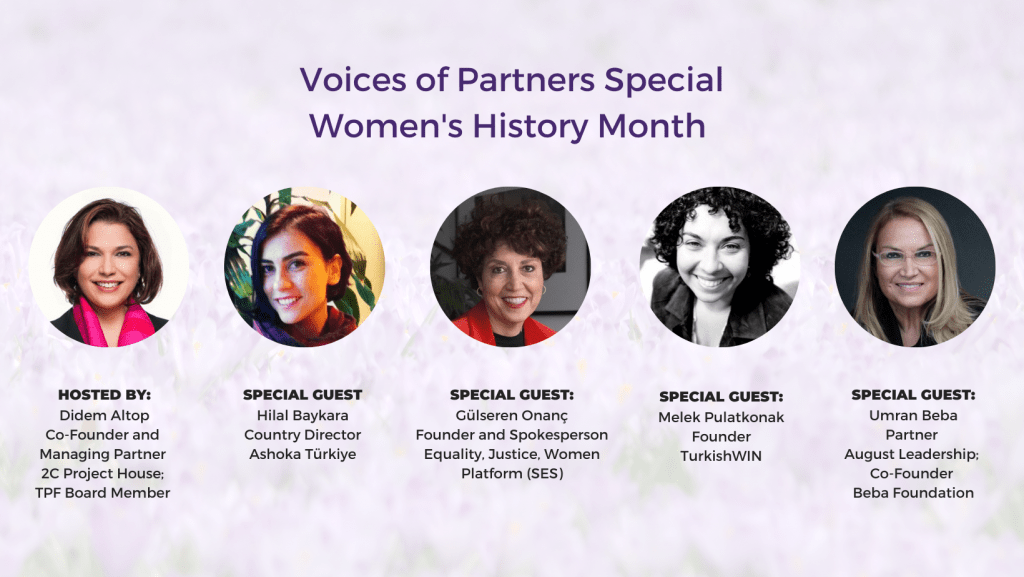Turkish Philanthropy Funds (TPF) hosted SES Equality and Solidarity Association, Ashoka Turkey, TurkishWINN and Beba Foundation this month, as part of its “Voices of Partners” talks it conducts with different TPF partners every month.

Turkish Philanthropy Funds, headquartered in New York, USA, and carrying out non-profit philanthropy activities, hosted SES Equality and Solidarity Association, Ashoka Turkey, BinYaprak and Beba Foundation this month as part of its “Voices of Partners” talks.
In the talks, the founders of these organizations shared their experiences from being change makers in leadership to empowering women through their meaningful work.
“Envisioning a world where everyone is a change maker”
Hilal Baykara from Ashoka Turkey, a network of social entrepreneurs, underlined that her organisation is envisioning a world where everyone is a changemaker. Her work entails supporting entrepreneurs and building support networks. This provides a process of learning which can provide solutions to the complex problems of the world. Baykara has underlined that the new Ashoka Turkey report titled “Unlonely Planet” demonstrated that almost all of their members seek system change.
“Solidarity is one of our key values”
Gülseren Onanç started her speech by underlining that she has been a businesswoman and a politician, but in the path of her career, she has been active in women’s rights. She states that “we need more civil society”, and we should give additional support to the women’s movement in Turkey. This is why she has pioneered the formation of the Equality, Justice and Women Platform. The Platform collects news and stories from Turkey and the rest of the world. Inspirational stories focus on how we can change the world, and the Platform provides stories of women leaders in arts, sports and activism. She also states that the Platform tries to look at the world from a women’s perspective.
Onanç has underlined that solidarity is one of the key values of SES. At the end of the speech, the moderator Didem Altop underlined that this project provides a role model effect for women. At another round of debates, Onanç underlined the struggle that women are pursuing to exist as equals. The pandemic has also highlighted the inequalities that were already out there. By giving the case of Afghanistan as an example, Onanç said that there are multiple struggles with higher or lower costs around the world. The case of Afghanistan has seen disastrous backsliding on women’s rights with facts like the lack of access to education.
She further underlined that there is a great correlation between women in power and democracy. By stating that countries like Finland and Iceland have demonstrated that women’s leadership brings equality and peace, she argued that the pandemic demonstrated that women leaders handled a crisis event very well. She has linked this trend to the contrast with authoritarian countries where women are usually not let into politics. By underlining the consequences of this exclusion, which could lead to war, Onanç stated that “We need more women in charge to fulfil sustainable development goals”.
Onanç further underlined that the newsletter of the Equality, Justice and Women Platform and social media accounts had reached a huge audience. She argued that there is a lot of news content out there, but there is a need to frame the news and put them into perspective. By also referring to current affairs, she has stated that the current perspective on Russia is shaped by punishing and the rhetoric of war. She conversely said that there is a need to raise the perspective of peace. At the end of her speech, she cautioned if we leave the world to men, we are going towards a collapse.
“Collective success is a model for us.”
Melek Pulatkonak started her speech by reflecting on how she came the found the Turkish women, an organisation that helps connect women “who are open-hearted and open-minded with a cultural, professional or a family tie to Turkey anywhere in the world. “
She stated that they believe that everybody can be a changemaker and the 600 members have a mentoring programme, events, speaker club and a digital platform. Pulatkonak underlined that collective success is a model for their organisation. She further mentioned that she is working to bring more women together and empowering groups and underlined the importance of sustainability projects.
Supporting women’s skills and passions
In her talk, Umran Beba talked about her professional career, the Beba foundation that aims to support young people and women in entrepreneurship. She stated that there are three pillars in the works she is conducting at the moment: commercial, board duties with non-profit organisation boards and the Beba Foundation. The training and network programmes, with the board partnerships, aims to teach young kids and women entrepreneurship. She states that this can be a way for women to find their skills and passions, which can bring growth.
The importance of civil society
The participants underlined the importance of civil society for defending equal rights and holding the government accountable. Hilal Baykara underlined that the feminist movement in Turkey, which has its roots in the Ottoman Empire, had demonstrated the structural barriers that keep women behind. She states that patriarchal relationships are not over, and therefore, there is a need to convince men to push solidarity networks. Pulatkonak underlined the importance of sisterhood, allyship that includes men and increasing role modelling. “If there is good role modelling, more women will enter civil society. Gender equality is not a women’s issue; it is a societal issue. We need to create an equal world together. The world needs women in every aspect.”

